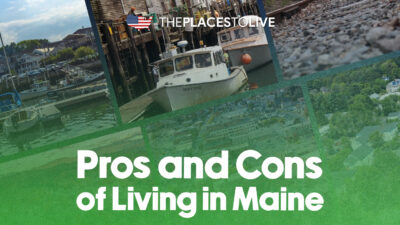Pros and Cons of Living in Rhode Island: A Comprehensive Guide to Rhode Island Quality of Life
This article explores the pros and cons of living in Rhode Island. As the smallest state in the United States by area, Rhode Island offers a distinctive lifestyle known for its coastal charm, rich history, and community-focused living. Many people consider relocating here due to its walkable cities, scenic beaches, and a relatively high Rhode Island quality of life, particularly when compared to larger metropolitan areas in New England.
In the following sections, we provide a detailed evaluation of the living in Rhode Island benefits, as well as some Rhode Island lifestyle drawbacks, giving you a thorough understanding of the Rhode Island pros and cons to help you make an informed decision about whether this small, vibrant state might be the right place for you.
Overview of Rhode Island Lifestyle

The Rhode Island lifestyle is a unique mix of coastal New England charm and urban accessibility, primarily centered around the capital city, Providence. Despite its small geographic size, Rhode Island boasts a rich social and cultural fabric deeply intertwined with historic sites, natural beauty, and active community participation.
Social and Cultural Characteristics
Residents enjoy proximity to some of the most renowned historic landmarks in the country, such as the Newport mansions and numerous colonial-era sites. The coasts feature sandy beaches along Narragansett Bay and the Atlantic Ocean, offering ample parks and outdoor spaces. The arts scene is vibrant, with theaters, galleries, and festivals that celebrate local culture year-round.
Community and Accessibility
Geographically compact, Rhode Island encourages a strong sense of community. With a moderate population density, many neighborhoods remain walkable, and commutes are often manageable in contrast to larger metropolitan regions. This small-state charm fosters personal connections that many residents treasure. For more on walkability and compact urban living, see 10 Most Walkable Cities in the US.
Environment and Weather
Being a coastal state, Rhode Island enjoys maritime influences with crisp sea breezes and ample water-based activities. However, it also experiences seasonal weather extremes: cold, snowy winters and humid, warm summers. This seasonal variability can both charm and challenge residents.
Lifestyle Benefits and Challenges
While the Rhode Island quality of life is bolstered by easy access to nature, cultural richness, and a tight-knit community, there are also trade-offs. Housing costs tend to be higher than in many rural or inland areas, entertainment and shopping choices are limited compared to large cities, and the weather can be a downside for some. These factors shape the Rhode Island pros and cons that will be explored in detail below.
Pros of Living in Rhode Island

Rhode Island offers many advantages that contribute to a high standard of living. Here we outline the key living in Rhode Island benefits that make it an attractive place to call home.
Coastal Access and Scenic Beauty
One of the most significant draws is Rhode Island’s extensive coastlines along Narragansett Bay and the Atlantic Ocean. Residents enjoy easy access to pristine beaches, boating, fishing, and a variety of year-round outdoor recreational activities like sailing, hiking, and biking.
The scenic beauty—from rocky shores and lighthouses to tranquil bays—enhances daily life and promotes a healthy, active lifestyle. For other scenic places to live in the US, explore 10 Most Scenic Towns to Live in the US.
Cultural and Historical Richness
Rhode Island is steeped in history. The state boasts numerous historic mansions, museums, and landmarks, such as the Mystic Seaport and the Rhode Island School of Design Museum. Annual festivals, art fairs, and music events provide cultural engagement opportunities for residents of all ages, contributing to a lifestyle enriched by learning and entertainment.
Strong Community Feel and Small-State Charm
Because Rhode Island is geographically tiny but densely populated enough to sustain urban centers, residents benefit from a close-knit community vibe. Neighborhoods and towns often host local gatherings, farmers markets, and community events that foster social cohesion and civic pride. This connection reduces typical urban stress and offers a slower, more personable pace of life.
Quality of Life Factors
- Education: Rhode Island supports a well-regarded education system, including good public and private schools. Universities such as Brown University and the University of Rhode Island provide educational resources and cultural contributions to the state.
- Healthcare: Healthcare services in Rhode Island are notable for quality care. Although some access challenges exist (e.g., specialist shortages), overall medical services rank well, reflecting in positive health outcomes for residents.
- Public Services and Safety: Many areas in Rhode Island enjoy a moderate crime rate and have access to reliable public infrastructure, including libraries, transportation, and recreational facilities, enhancing safety and convenience. For insights on safe cities and communities, you can reference 10 Safest Cities to Live in the US.
Cost of Living Advantages
While housing costs can be high within urban centers, many suburbs and smaller towns offer a more affordable cost of living compared to neighboring Massachusetts and Connecticut markets. This relative affordability is especially appealing for families and first-time homebuyers looking for value without sacrificing quality. Related information can be found at 10 Best Suburbs to Live in the US.
Resources for Relocators
For those considering moving to Rhode Island, useful tools include real estate platforms like Zillow and Realtor.com for home searches, as well as moving services like U-Haul and PODS to simplify relocation logistics.
Cons of Living in Rhode Island
Despite its many positives, the Rhode Island lifestyle drawbacks present real considerations for potential residents. Understanding these challenges will help you weigh the Rhode Island pros and cons more accurately.
Weather Challenges
Rhode Island experiences significant seasonal changes. Winters can bring heavy snowfalls and freezing temperatures, which some people find difficult. Summers tend to be warm and humid due to the state’s Atlantic coastal position. These extremes can affect daily comfort and increase costs related to heating, cooling, and snow removal. Learn about managing seasonal weather in different states at 10 Best Places to Live in the US.
Job Market Limitations
The state’s economy is concentrated in sectors such as healthcare, education, and tourism. While these sectors provide stability, they also limit career diversity. Professionals in specialized industries or larger corporate sectors may find fewer job opportunities or require commuting to nearby states.
Traffic Congestion
Parts of Rhode Island, especially around Providence and the well-known Newport corridor, suffer from significant traffic congestion during peak hours. This reduces commute convenience and can impact overall quality of life, despite the state’s small size.
Limited Entertainment and Shopping Options
Compared to larger metropolitan areas, Rhode Island offers fewer choices when it comes to entertainment venues, shopping malls, and nightlife. Some residents may find options limited, requiring travel outside the state for more extensive offerings.
Environmental and Coastal Risks
Rhode Island faces ongoing environmental challenges, including the risk of coastal flooding and storm surges, which are becoming more frequent and severe due to climate change. Low-lying communities and commercial areas are particularly vulnerable, making property insurance and preparedness vital.
Resources for Managing Cons
To help manage harsh winters, winter gear like Snow Joe snow removal tools can be invaluable. For coastal property owners or renters, insurance providers such as State Farm and Allstate offer coverage options tailored to flood risks and natural disasters.
Rhode Island Quality of Life Analysis

An in-depth look at the Rhode Island quality of life reveals a nuanced picture based on data from the RI Life Index, a collaborative effort by Blue Cross & Blue Shield of Rhode Island and Brown University. This index tracks key well-being drivers including affordable housing, healthcare, employment, education, food security, and safety.
Strengths in Quality of Life
Rhode Island scores well in healthcare availability and community connectedness. Despite its small size, the state ensures many residents have access to medical services and supportive networks. Recreational amenities such as beaches, parks, museums, and cultural festivals are accessible within short distances, enhancing daily life and leisure opportunities.
Challenges in Quality of Life
Housing affordability remains a notable concern, especially given rising real estate prices in and around Providence. Job opportunities, while stable in healthcare and education, are less diverse than in neighboring states, limiting options for some career seekers.
Comparisons with Neighboring States
Compared with Massachusetts and Connecticut, Rhode Island excels in community feel and healthcare access but trails in overall job market variety and housing availability. The smaller size means fewer metropolitan advantages but contributes to less urban sprawl and easier access to natural amenities.
Recreational and Cultural Opportunities
The state’s compact geography allows residents to enjoy the best of beaches, trails, and cultural events without long commutes. Annual festivals and tourist attractions contribute to a lively and engaging social scene.
Travel and Experience
For those wanting to sample Rhode Island living before relocating, platforms such as Airbnb Experiences and Viator offer local tours, cultural events, and outdoor activities to explore community life and the region’s rich heritage.
FAQs about Living in Rhode Island
What are the biggest benefits of living in Rhode Island?
Rhode Island offers major benefits such as easy coastal access, a strong community environment, quality education through excellent schools and universities like Brown University, good healthcare services, and more affordable living costs compared to neighboring states.
What are common challenges residents face in Rhode Island?
Common Rhode Island lifestyle drawbacks include high housing costs in urban centers, harsh winters with cold and snow, limited diversity in job opportunities, traffic congestion especially around Providence, and risks related to coastal flooding and climate change.
How is the job market in Rhode Island?
The job market is mainly centered around healthcare, education, and tourism. While stable, these sectors do not cover the same breadth of job types as larger cities, so some professionals might find career options limited.
How does Rhode Island’s cost of living compare to other New England states?
Overall, Rhode Island tends to be more affordable than Massachusetts and Connecticut, especially in housing outside urban areas. However, the cost of living is rising, which may reduce this advantage over time.
Is Rhode Island family-friendly?
Yes. Rhode Island has good public and private schools, safe communities, plenty of family-oriented recreational activities, and a community atmosphere that supports families.
What is the typical climate throughout the year?
Rhode Island features four distinct seasons, with cold, snowy winters and warm, humid summers. The climate is strongly influenced by the nearby Atlantic Ocean, moderating temperature extremes somewhat but adding humidity in summer.
Conclusion
The pros and cons of living in Rhode Island boil down to balancing attractive coastal living, a strong community spirit, and cultural richness against challenges like harsh winters, a limited job market, traffic congestion, and environmental risks.
Key positives include access to scenic beaches, well-regarded education and healthcare systems, and a comfortable pace of life supported by Rhode Island’s compact size. However, the weather, economic concentration in specific sectors, and coastal flooding risks require thoughtful consideration.
Ultimately, the Rhode Island pros and cons vary depending on individual priorities and preferences. A clear understanding of these factors, combined with personal lifestyle goals, empowers you to determine if Rhode Island’s unique lifestyle aligns well with your needs.
With a clear understanding of these Rhode Island pros and cons and the detailed insights on quality of life, you can confidently assess if this charming coastal state is the right fit for your next chapter. Whether drawn by its scenic beauty, rich culture, or community warmth, Rhode Island offers a lifestyle unlike any other small state in New England.





